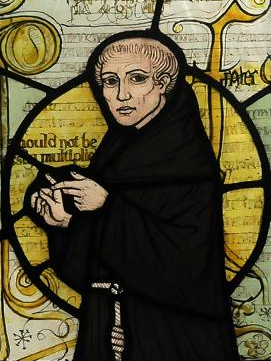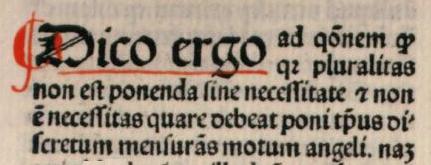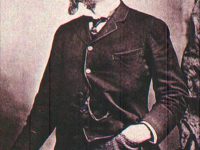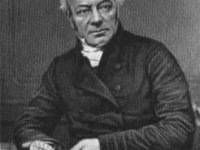
William of Ockham (c.1287-1347)
Probably on April 10, 1347, English Franciscan friar and scholastic philosopher and theologian William of Ockham passed away. He is considered to be one of the major figures of medieval thought and was at the centre of the major intellectual and political controversies of the fourteenth century. He is commonly known for Occam’s razor, the methodological principle that bears his name, and also produced significant works on logic, physics, and theology. Probably you have already heard of Occam’s razor. No, you can’t get a clean shave with it. It’s a logical principle of minimalism and I always have to explain it to my students in my lectures on semantics and ontology. But, lots of references can also be found in popular culture, as e.g. in the Jodie Foster movie ‘Contact‘, or the TV series ‘House M.D.’. But, first let’s have a look on its originator: William of Ockham.
“Logic is the most useful tool of all the arts. Without it no science can be fully known. It is not worn out by repeated use, after the manner of material tools, but rather admits of continual growth through the diligent exercise of any other science. For just as a mechanic who lacks a complete knowledge of his tool gains a fuller [knowledge] by using it, so one who is educated in the firm principles of logic, while he painstakingly devotes his labor to the other sciences, acquires at the same time a greater skill at this art.”
– William of Ockham, Summa Logicae (c. 1323), Prefatory Letter, as translated by Paul Vincent Spade (1995)
Greyfriar William of Ockham
William of Ockham was born in Ockham (= Oak Hamlet), Surrey, a little to the southwest of London, in 1285 and joined the Franciscan order (the so called “Greyfriars”) already at an early age. It is believed that he studied theology at the University of Oxford from 1309 to 1321, but while he completed all the requirements for a master’s degree in theology he was never made regent master. Because of this, he acquired the honorific title Venerabilis Inceptor, or “Venerable Beginner”, i.e. an inceptor being a student formally admitted to the ranks of teachers by the university authorities. Ockham continued his academic career, apparently in English convents, simultaneously studying points of logic in natural philosophy and participating in theological debates.[2]
The Monasterial Rule of Life
At that time a central issue of concern in the Franciscan order and a main topic of debate in the church in general was the interpretation of the rule of life composed by St. Francis of Assisi concerning the strictness of the poverty that should be practiced within the order. Maybe you remember this dispute also being a topic in Umberto Eco’s famous medieval novel ‘The Name of the Rose‘[2]. Ockham’s early schooling in a Franciscan convent concentrated on the study of logic; throughout his career, his interest in logic never waned, because he regarded the science of terms as fundamental and indispensable for practicing all the sciences of things, including God, the world, and ecclesiastical or civil institutions; in all his disputes logic was destined to serve as his chief weapon against adversaries.
Comments on Peter Lombard
During the Middle Ages, theologian Peter Lombard’s Four Books of Sentences (1150) had become a standard work of theology and should remain as such until the 16th century, and many ambitious theological scholars wrote commentaries on it, among them also William of Ockham. However, Ockham’s commentary was not well received by his colleagues or by the Church authorities. In 1324, his commentary was condemned as unorthodox by a synod of bishops, and he was ordered to Avignon, France, to defend himself before a papal court. An alternative understanding suggests that he was initially appointed in Avignon as a professor of philosophy in the Franciscan school, and that his disciplinary difficulties did not begin until 1327. He never went back to England.
Conflict with the Pope
While in Avignon, Ockham stayed at the Franciscan convent there. It has sometimes been suggested that he was effectively under “house arrest,” but this seems an exaggeration.[4] In 1327, the Franciscan Minister General (the chief administrative officer of the order), Michael of Cesena, had been summoned to Avignon, to answer charges of heresy. A theological commission had been asked to review his Commentary on the Sentences, and it was during this that Ockham found himself involved in a different debate. Michael of Cesena had asked Ockham to review arguments surrounding Apostolic poverty. The Franciscans believed that Jesus and his apostles owned no property either individually or in common, and The Rule of Saint Francis commanded members of the order to follow this practice. This brought them into conflict with Pope John XXII.
Excommunication
Because of the pope’s attack on the Rule of Saint Francis, Ockham, Michael of Cesena and other leading Franciscans fled Avignon on 26 May 1328, and eventually took refuge in the court of the Holy Roman Emperor Louis IV of Bavaria, who was also engaged in dispute with the papacy, and became Ockham’s patron. After studying the works of John XXII and previous papal statements, Ockham agreed with the Minister General. In return for protection and patronage Ockham wrote treatises that argued for emperor Louis to have supreme control over church and state in the Holy Roman Empire. On June 6, 1328, Ockham was officially excommunicated for leaving Avignon without permission, and Ockham argued that John XXII was a heretic for attacking the doctrine of Apostolic poverty and the Rule of Saint Francis, which had been endorsed by previous popes. However it should be noted that Ockham’s philosophy was never officially condemned as heretical.

Part of a page from Duns Scotus’ book Ordinatio: “Pluralitas non est ponenda sine necessitate”, i.e., “Plurality is not to be posited without necessity”
Summa of Logic
Logic, for Ockham, is crucial to the advancement of knowledge. Ockham’s main logical writings consist of a series of commentaries (or “expositions”) on Aristotle’s and Porphyry’s own logical works, plus his own Summa of Logic, his major work in the field.[4] In scholasticism, Ockham advocated for a reform both in method and in content, the aim of which was simplification. Ockham incorporated much of the work of previous theologians, Such as John Duns Scotus, from whom he derived his view of divine omnipotence, his view of grace and justification, much of his epistemology and also ethical convictions. However, he also reacted to and against Scotus in the areas of predestination, penance, his understanding of universals, his formal distinction ex parte rei (that is, “as applied to created things”), and his view of parsimony which became known as Occam’s Razor.
Occam’s Razor
Occam’s razor is a principle for problem solving, which can be interpreted as stating Among competing hypotheses, the one with the fewest assumptions should be selected. The term Occam’s razor first appeared in 1852 in the works of Sir William Hamilton, centuries after William of Ockham’s death. Ockham did not invent this “razor”. Its association with him may be due to the frequency and effectiveness with which he used it. However, Ockham stated the principle in various ways, but the most popular version, “Entities must not be multiplied beyond necessity” (Non sunt multiplicanda entia sine necessitate) was formulated by the Irish Franciscan philosopher John Punch in his 1639 commentary on the works of Duns Scotus. While it has been claimed that Ockham’s razor is not found in any of his writings, one can cite statements such as Numquam ponenda est pluralitas sine necessitate (Plurality must never be posited without necessity), which occurs in his theological commentaries on the ‘Sentences’ of Peter Lombard (Quaestiones et decisiones in quattuor libros Sententiarum Petri Lombardi).
What does it mean?
“Purely philosophical assertions which do not pertain to theology should not be solemnly condemned or forbidden by anyone, because in connection with such [assertions] anyone at all ought to be free to say freely what pleases him.”
– William of Ockham, Dialogus, Vol. I, Book 2, Ch. 22, as translated by John Scott (1999)
So what does it mean? In fact, possible explanations can become needlessly complex. It is coherent, for instance, to add the involvement of leprechauns to any explanation, but Occam’s razor would prevent such additions unless they were necessary. In the scientific method, Occam’s razor is not considered an irrefutable principle of logic or a scientific result; the preference for simplicity in the scientific method is based on the falsifiability criterion. For each accepted explanation of a phenomenon, there may be an extremely large, perhaps even incomprehensible, number of possible and more complex alternatives, because one can always burden failing explanations with ad hoc hypotheses to prevent them from being falsified; therefore, simpler theories are preferable to more complex ones because they are more testable.
Ockham’s Razor, in the senses in which it can be found in Ockham himself, never allows us to deny putative entities. At best it allows us to refrain from positing them in the absence of known compelling reasons for doing so. In part, this is because human beings can never be sure they know what is and what is not “beyond necessity”; the necessities are not always clear to us.[4] With this tendency towards simplification was united a very marked tendency towards skepticism a distrust, namely, of the ability of the human mind to reach certitude in the most important problems of philosophy.[5]
Razors and Anti-Razors
Karl Popper argues that a preference for simple theories need not appeal to practical or aesthetic considerations.[8] Also Ludwig Wittgenstein [9] refers to Occams razor in his Tractatus Logico-Philosophicus: “Occam’s Razor is, of course, not an arbitrary rule nor one justified by its practical success. It simply says that unnecessary elements in a symbolism mean nothing. Signs which serve one purpose are logically equivalent; signs which serve no purpose are logically meaningless.” But also famous “anti-razors” have been created such as e.g. by Gottfried Wilhelm Leibniz [7] and Immanuel Kant.[3] Kant felt a need to moderate the effects of Occam’s razor and thus created his own counter-razor: “The variety of beings should not rashly be diminished.“
Later Life
Ockham spent much of the remainder of his life writing about political issues, including the relative authority and rights of the spiritual and temporal powers. After Michael of Cesena’s death in 1342, William became the leader of the small band of Franciscan dissidents living in exile with Louis IV until his death on 9 April 1347. He was officially rehabilitated by pope Innocent VI in 1359.
How Occam’s Razor Changed the World of Science – with Johnjoe McFadden, [12]
References and Further Reading:
- [1] William of Ockham, English philosopher, at Britannica Online
- [2] Umberto Eco and the Science of Semiotics, SciHi blog, January 5, 2014.
- [3] Immanuel Kant – Philosopher of the Enlightenment, SciHi blog, February 12, 2014.
- [4] Moody, Ernest (2006). “William of Ockham”. Encyclopedia of Philosophy. Detroit: Gale.
- [5] William of Ockham, in the Catholic Encyclopedia
- [6] William of Ockham at Wikidata
- [7] Let Us Calculate – the Last Universal Academic Gottfried Wilhelm Leibniz, SciHi Blog
- [8] Karl Popper and the Philosophy of Science, SciHi Blog
- [9] The Philosophy of Ludwig Wittgenstein, SciHi Blog
- [10] The Myth of Occam’s Razor by William M. Thorburn (1918)
- [11] BBC Radio 4 ‘In Our Time’ programme on Ockham
- [12] How Occam’s Razor Changed the World of Science – with Johnjoe McFadden, The Royal Institution @ youtube
- [13] Baker, Alan (25 February 2010). “Simplicity”. In Zalta, Edward N. (ed.). The Stanford Encyclopedia of Philosophy (Summer 2011 Edition).
- [14] Jefferys, William H.; Berger, James O. (1991). “Ockham’s Razor and Bayesian Statistics”. American Scientist. 80 (1): 64–72.
- [15] W. M. Thorburn (1918). “The Myth of Occam’s Razor”. Mind. 27 (107): 345–353.
- [16] Timeline of People excommunicated by the Roman Catholic Church, via DBpedia and Wikidata





